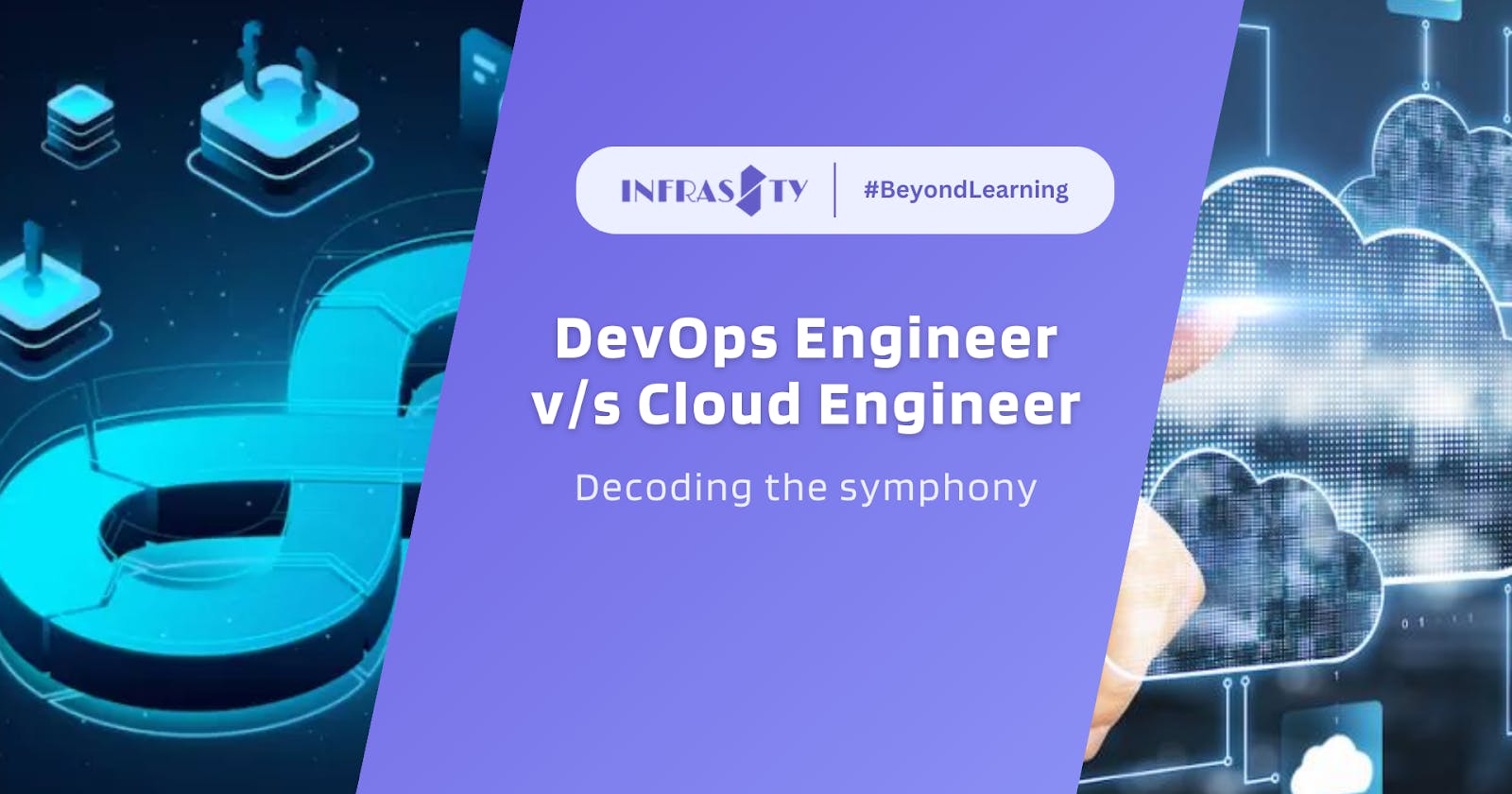Infrasity Bite-Sized Learning | Summary
DevOps Engineers bridge the gap between development and operations, focusing on collaboration, automation, and continuous delivery, while Cloud Engineers specialize in designing and managing cloud infrastructure, ensuring scalability and security. DevOps Engineers streamline development pipelines and promote a culture of agility, while Cloud Engineers optimize cloud architectures and resources. Collaboration between these roles is crucial for successful digital transformations, as DevOps Engineers rely on Cloud Engineers for underlying infrastructure, and Cloud Engineers work closely with DevOps Engineers to ensure seamless application delivery. Understanding the distinctions and leveraging their combined strengths enables organizations to achieve efficiency, scalability, and agility in today's technology landscape.
DevOps and Site Reliability Engineering (SRE) are two methodologies that overlap in their goals and practices. DevOps emphasizes collaboration, continuous integration, and automation to bridge the gap between development and operations. SRE focuses on applying software engineering practices to ensure system reliability through automation, monitoring, and incident response. Both DevOps and SRE prioritize collaboration, automation, and monitoring. They also emphasize incident response and post-mortems to drive continuous improvement. By leveraging the strengths of both methodologies, organizations can optimize collaboration, efficiency, and reliability in software development and operations.
The changing landscapes of technology have given birth to two roles that are vital enablers of digital transformation: DevOps Engineers and Cloud Engineers. While these roles often work hand in hand, they possess unique skill sets and responsibilities. In this blog post, we will embark on a journey to unravel the differences between DevOps Engineers and Cloud Engineers, exploring their distinct domains and the crucial roles they play in shaping modern IT infrastructures.
Defining the DevOps Engineer:
a) Introducing the DevOps Engineer role
1) Emphasis on the intersection of software development and operations
2) Expertise in collaboration, automation, and continuous delivery
3) Focus on streamlining development pipelines and fostering a culture of agility
b) Defining the Cloud Engineer role
1) Specialization in designing, implementing, and managing cloud infrastructure
2) Proficiency in cloud service providers and their associated tools
3) In-depth knowledge of cloud architecture, scalability, and security practices
Core Responsibilities:
DevOps Engineer:
1) Orchestrating collaboration and communication between development and operations teams
2) Implementing and managing CI/CD pipelines for seamless software delivery
3) Automating deployment processes and configuration management
4) Encouraging the adoption of DevOps practices and culture within the organization
Cloud Engineer:
1) Designing and implementing scalable and reliable cloud architectures
2) Managing and optimizing cloud resources for cost efficiency
3) Ensuring the security and compliance of cloud environments
4) Monitoring and troubleshooting cloud infrastructure and services
Skill Sets:
DevOps Engineer:
1) Proficiency in scripting and programming languages (e.g., Python, Ruby, or PowerShell)
2) Deep understanding of CI/CD tools and practices (e.g., Jenkins, GitLab CI/CD)
3) Familiarity with configuration management tools (e.g., Ansible, Chef, or Puppet)
4) Knowledge of containerization and orchestration technologies (e.g., Docker, Kubernetes)
Cloud Engineer:
1) Expertise in cloud service providers (e.g., AWS, Azure, or Google Cloud Platform)
2) Understanding of infrastructure automation using tools like Terraform or CloudFormation
3) Knowledge of networking, security, and compliance in the cloud
4) Ability to optimize cloud costs and implement cost-control measures
Collaboration and Synergy:
While DevOps Engineers and Cloud Engineers have distinct focuses, their collaboration is essential for successful digital transformations:
1) DevOps Engineers rely on Cloud Engineers to provide the underlying infrastructure for their CI/CD pipelines and deployments.
2) Cloud Engineers work closely with DevOps Engineers to ensure that the cloud environment is optimized for seamless application delivery.
Both roles collaborate on security practices, monitoring, and incident response in the cloud.
In the symphony of technological innovation, DevOps Engineers and Cloud Engineers perform unique dances that harmonize the realms of software development, operations, and cloud infrastructure. While DevOps Engineers orchestrate collaboration and streamline delivery pipelines, Cloud Engineers design and manage scalable and secure cloud architectures. Understanding the distinctions between these roles empowers organizations to leverage their combined strengths, fostering agility, scalability, and efficiency in the pursuit of digital excellence. The collaboration and synergy between DevOps Engineers and Cloud Engineers form the foundation for achieving optimal results in today's rapidly evolving technology landscape.

